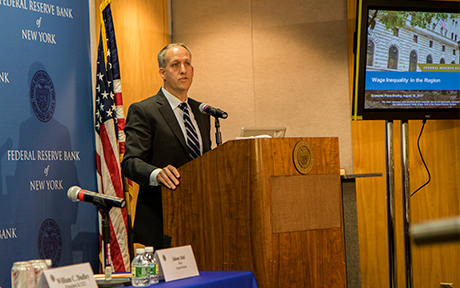This post presents our quarterly update of the economic forecasts generated by the Federal Reserve Bank of New York’s dynamic stochastic general equilibrium (DSGE) model. We describe very briefly our forecast and its change since May 2017.
What Drives International Bank Credit?
A major question facing policymakers is how to deal with slumps in bank credit.
At the New York Fed: The Appropriate Government Role in U.S. Mortgage Markets
While the U.S. mortgage finance system was at the center of the recent financial crisis, it remains largely untouched by legislative reforms. At the center of these conversations are Fannie Mae and Freddie Mac—both of which were placed into federal conservatorship in September 2008.
Just Released: Introducing the SCE Labor Market Survey

The New York Fed has just released new data on individuals’ experiences and expectations in the labor market. These data have been collected every four months since March 2014 as part of the Survey of Consumer Expectations (SCE). In this post we introduce the SCE Labor Market Survey and highlight some of its features.
“Hey, Economist!” How Was Your Ph.D. Internship?

This week, four Ph.D. students in economics and finance are wrapping up their summer internships at the New York Fed’s Research Department. The ten-week internships—which are compensated—offer interns the opportunity to further their dissertation research, interact with the Bank’s research economists, and give informal, “brown bag” lunch seminars to hear feedback on their work.
Counterparty and Collateral Policies of Central Bank Lending Facilities

In a previous post, we compared the Federal Reserve’s discount window with the standing lending facilities (SLFs) at the Bank of England (BoE), the European Central Bank (ECB), and the Bank of Japan (BoJ). We showed that the Fed’s discount window was less integrated with monetary policy than the SLFs of the other central banks. In this post, we observe that the counterparty and collateral policies of the Fed’s discount window are similarly less integrated with the practices involved in monetary policy operations, in comparison with the other central banks.
Just Released: More Credit Cards, Higher Limits, and . . . an Uptick in Delinquency
Just Released: Economic Press Briefing Focuses on Regional Wage Inequality

The New York-Northern New Jersey region is home to some of the most and least unequal places in the nation, based on research presented today at our economic press briefing examining wage inequality in the region. Wage inequality—meaning the disparity in earnings between workers—has increased significantly in the United States since the early 1980s, though some places have much more wage inequality than others. Fairfield, Conn., for example, ranks as the most unequal metropolitan area in the country, and the New York–Northern New Jersey metropolitan area ranks in the top ten. On the other hand, most of the metropolitan areas in upstate New York are among the least unequal places in the country.
Investor Diversity and Liquidity in the Secondary Loan Market
Over the last two decades, the U.S. secondary loan market has evolved from a relatively sleepy market dominated by banks and insurance companies that trade only occasionally to a more active market comprising a diversified set of institutional investors, including collateralized loan obligations (CLOs), loan mutual funds, hedge funds, pension funds, brokers, and private equity firms.
Regulatory Incentives and Quarter‑End Dynamics in the Repo Market

Since the global financial crisis, central bankers and other prudential authorities have worked to design and implement new banking regulations, known as Basel III, to reduce risk in the financial sector. Although most features of the Basel III regime are implemented consistently across jurisdictions, some important details vary.












 RSS Feed
RSS Feed Follow Liberty Street Economics
Follow Liberty Street Economics